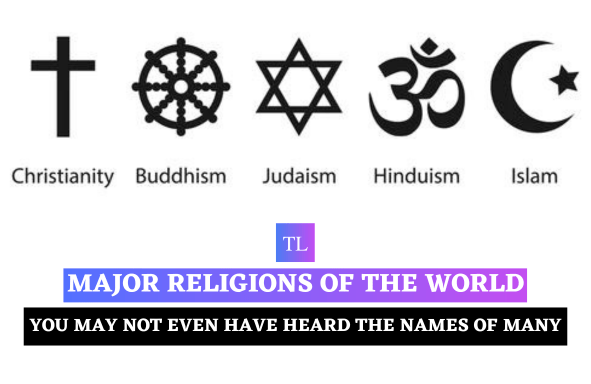Religions Knowledge: There are many different religions in the world, which have different beliefs and practices. Although it is difficult to accurately count the number of religions, as some may not have a centralized structure or clear doctrine, some major religions can be identified based on the number of adherents and their geographic spread. Here are some of the world’s largest and most widely practiced religions:
1. Christianity:
Christianity is one of the largest and most widely practiced religions in the world, with over 2 billion adherents. It is based on the teachings of Jesus Christ, as recorded in the New Testament of the Bible. Christianity is divided into three main branches: Catholicism, Protestantism, and Orthodoxy.
2. Islam:
Islam is the second largest religion in the world with more than 1 billion followers. It is based on the teachings of the Prophet Muhammad, as recorded in the Quran. Islam is divided into two main branches: Sunni and Shia.
3. Hinduism:
Hinduism is one of the oldest religions in the world and the third largest with over 900 million followers. It originated in India and is characterized by a wide variety of beliefs and practices, including the worship of multiple deities and an emphasis on dharma, or duty and morality.
Read More-
- These Are The Important Things In The Life Of Lord Krishna That Everyone Should Know
- Quran Burnt In Front Of Everyone, Europe’s Rebellion Against Islam!
4. Buddhism:
Buddhism is a major religion with over 500 million followers, mainly in Asia. It was founded in ancient India by the Buddha, also known as Siddhartha Gautama, and emphasizes the importance of compassion and wisdom in achieving enlightenment.
5. Sikhism:
Sikhism is a monotheistic religion with over 30 million followers, mainly in the Punjab region of India and Pakistan. It was founded by Guru Nanak in the 15th century and emphasizes devotion to God and the importance of service to others.
6. Jainism:
Jainism is an ancient religion of India which emphasizes on non-violence, truth and non-violence. Its followers, the Jains, strive to cause the least harm to all living beings. They believe in karma, the concept that every action has consequences. Jainism promotes spiritual liberation through self-discipline, meditation and ethical living. Jains practice vegetarianism and respect all forms of life. The religion values tolerance, non-dogmatism and multiple perspectives. Jainism has temples for worship and a well-developed philosophical system. It is one of the oldest religions in the world and has significant followers in India and other parts of the world.
7. Judaism:
Judaism is one of the oldest monotheistic religions with more than 15 million followers. It originated in the Middle East and is based on the belief in one God and the observance of religious laws and traditions set forth in the Torah and other sacred texts.
8. Bahá’í Faith:
The Bahá’í Faith is a relatively new religion with over 7 million followers worldwide. It was founded in Persia (modern Iran) in the 19th century and emphasizes the unity of all religions and the importance of peace and justice.
9. Confucianism:
Confucianism is a philosophical and ethical tradition that originated in ancient China, with more than 5 million followers. It stresses the importance of education, morality and the pursuit of knowledge.
10. Taoism:
Taoism is a philosophical and religious tradition that originated in ancient China, with over 2 million followers. It stresses the importance of living in harmony with the Tao, or the underlying natural order of the universe.
These are just a few of the many major religions of the world. While some of these religions have large numbers of adherents, there are also many other smaller religious groups, such as Jainism, Shintoism, and indigenous religions, which are important for their adherents and contribute to the rich image of religious diversity in the world.
Despite their differences, many of these religions share similar values and beliefs, such as the importance of compassion, love, and peace. Additionally, many have similar goals, such as helping people live meaningful and fulfilling lives and understanding the mysteries of the universe.
Discover more from THE LOKMAT
Subscribe to get the latest posts sent to your email.




